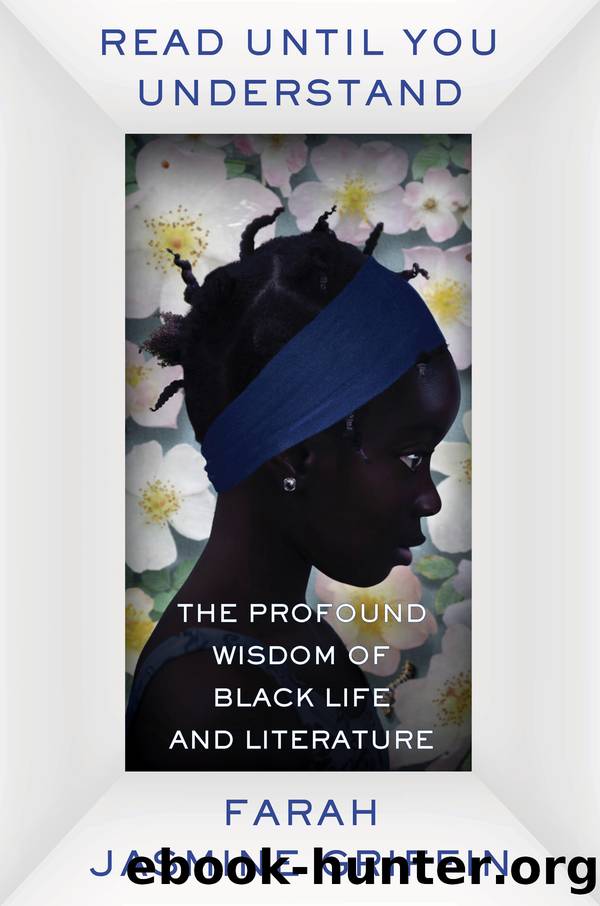Read Until You Understand: The Profound Wisdom of Black Life and Literature by Farah Jasmine Griffin

Author:Farah Jasmine Griffin [Griffin, Farah Jasmine]
Language: eng
Format: epub, mobi, azw3
Tags: Literary Criticism, American, African American & Black, Biography & Autobiography, Cultural; Ethnic & Regional, Personal Memoirs
ISBN: 9780393651911
Google: 8T4fEAAAQBAJ
Publisher: W. W. Norton & Company
Published: 2021-09-14T00:21:08.737523+00:00
Dear lovely Death
That taketh all things under wingâ
Never to killâ
Only to change
Into some other thing
This suffering flesh,
To make it either more or less,
But not again the sameâ
Dear lovely Death,
Change is thy other name.
Does not this understanding of death provide comfort? Not the comfort offered by the promise of heaven and everlasting life, but more akin to the law of conservation of energy, âEnergy cannot be created or destroyed, it can only be changed from one form to another.â A people who have suffered death at the hands of their oppressors may have developed an understanding and conception of it that rescues us from the temptation of despair.
Hughesâs first line takes you aback. âDear lovely Deathâ? If you have lost a loved one, you probably feel less tenderly toward death; it is neither âdearâ nor âlovely.â If they suffered badly, indeed it may have been ugly. Arnold Rampersad, Hughesâs principal biographer, has noted that Hughes here might be echoing his admired Walt Whitmanâs âCome lovely and soothing death,â from his 1865 elegy for Abraham Lincoln, âWhen Lilacs Last in the Dooryard Bloomâd.â Hughesâs second line, âThat taketh all things under wing,â is a more eloquent stating of the cliché âDeath is the great equalizer.â All living things die: bugs and butterflies, fish and fowl, flowers and trees. Death takes us outside of our raced and gendered bodies, takes us out of our human bodies even, reduces us or enlarges us into something other. âOnly to change.â
My father, his friends, and other members of our familyâtheir lives were attenuated, not fully realized, except in the realm of love that they received and gave. Perhaps it was because of the absence of religious training in my youth, or the agnostic training of my father, that I never had a concept of Heaven, or an explanation of death such as Christianity provides. Maybe this is why I turned to literature and song. As an adult, I have often turned to Hughesâs poem and its promise of transformation after the loss of loved ones. However, I think the death here is not only that of a living being, but also the death of an idea or a place: capitalism or the United States, for instance. The end is not the end, but a change. Personally, the poem confirmed for me what I have intuited about this thing with which I have so much experience but which continues to elude my understanding. Hughes closes the poem, âChange is thy other name.â I have always known death to be change, to be the foreclosure of one set of possibilities and the opening of another.
In The Art of Death: Writing the Final Story, Haitian-American writer Edwidge Danticat turns to literature following the death of her mother. She writes: âI was so afraid of death that I wanted to desensitize myself to it. Now that my father and mother and many other people I love have died, I want to both better understand death and offload my fear of it, and I believe reading and writing can help.
Download
Read Until You Understand: The Profound Wisdom of Black Life and Literature by Farah Jasmine Griffin.mobi
Read Until You Understand: The Profound Wisdom of Black Life and Literature by Farah Jasmine Griffin.azw3
This site does not store any files on its server. We only index and link to content provided by other sites. Please contact the content providers to delete copyright contents if any and email us, we'll remove relevant links or contents immediately.
Machine Learning at Scale with H2O by Gregory Keys | David Whiting(4295)
Never by Ken Follett(3937)
Harry Potter and the Goblet Of Fire by J.K. Rowling(3848)
Unfinished: A Memoir by Priyanka Chopra Jonas(3381)
Fairy Tale by Stephen King(3370)
The Man Who Died Twice by Richard Osman(3072)
Will by Will Smith(2911)
Rationality by Steven Pinker(2352)
It Starts With Us (It Ends with Us #2) by Colleen Hoover(2344)
Can't Hurt Me: Master Your Mind and Defy the Odds - Clean Edition by David Goggins(2324)
The Dark Hours by Michael Connelly(2300)
The Storyteller by Dave Grohl(2229)
Friends, Lovers, and the Big Terrible Thing by Matthew Perry(2219)
The Dawn of Everything: A New History of Humanity by David Graeber & David Wengrow(2197)
The Becoming by Nora Roberts(2189)
The Stranger in the Lifeboat by Mitch Albom(2113)
Cloud Cuckoo Land by Anthony Doerr(2102)
Love on the Brain by Ali Hazelwood(2062)
Einstein: His Life and Universe by Walter Isaacson(2011)
